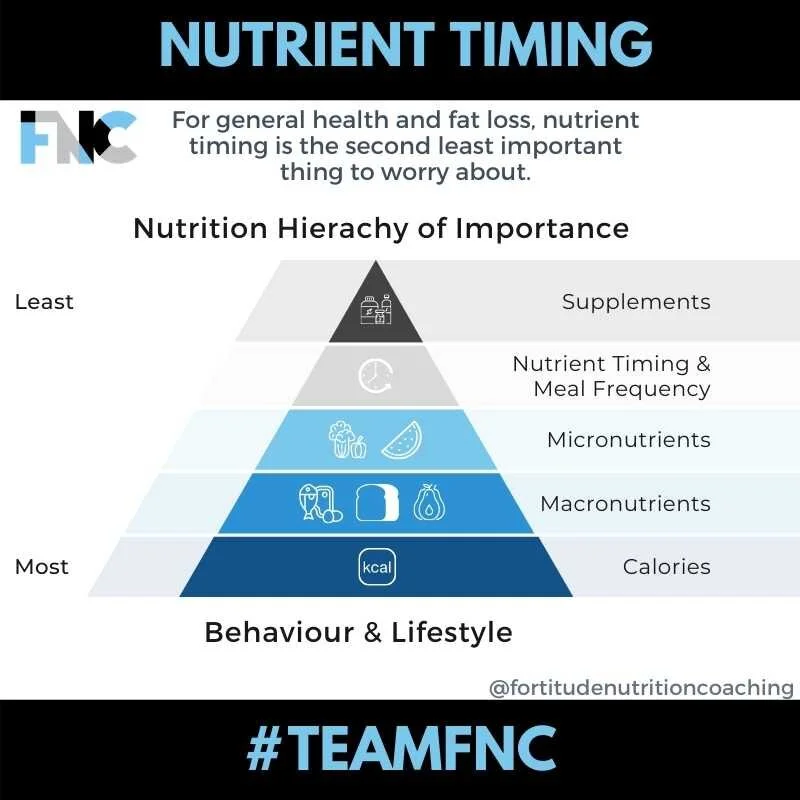The purpose of this blog is to explore:
The concept of nutrient timing
The level of importance for different health and fitness goals (fat loss, sports performance, overall health)
The basic principles of nutrient timing
How nutrient timing can work in a non-tracking method for fat loss
What is Nutrient Timing?
Sciency Explanation: Nutrient timing involves the purposeful ingestion of all types of nutrients at various times throughout the day to favourably impact the adaptive response to acute and chronic exercise (i.e., muscle strength and power, body composition, substrate utilisation, and physical performance, etc.). [1]
Simpler Explanation: Nutrition timing is eating certain macronutrients (protein, carbs and fats) at certain times of the day, in an attempt to improve performance in physical activity, body composition, and which fuel source will be used for different purposes.
The FN’Simple Explanation: Nutrition timing is eating specific foods, in specific amounts, at specific times.
It’s what you eat and when.
How important is nutrient timing?
In the overall order of importance, nutrient timing is the second least important component of nutrition to worry about for a fat loss and healthy eating goal. The most important thing is to find a way of eating that you can stick to and that promotes a healthy lifestyle.
In order of importance (most to least) for fat loss, we have:
Total Calories / energy balance
Macronutrients
Micronutrients
Nutrient timing and meal frequency
Supplements
Focus on the base of the pyramid below first, then build up from there.
Nutrient timing can be a useful strategy for some people and for others it can add unnecessary stress to their diet. It all depends on the goals and preferences of the individual.
How important is nutrient timing for your goals?
Nutrient timing will mean different things if you’re a Crossfit athlete or a librarian who doesn’t exercise but wants to improve their health through nutrition.
Nutrient timing is not very important if your goal is:
To improve your general health
Fat loss
If you’re just starting out exercising
If you do some weight training for less than 1 hour in a non-fasted state (eg, you have eaten some time before exercising)
It becomes more important more serious you are about your training.
You might start to think more about nutrient timing if your goal is:
To improve your muscle size and/or strength
If you’re an advanced exerciser
If you train fasted (ie. you don’t eat before exercise)
If you train for more than 1 hour per day
Nutrient timing becomes important if:
You’re number 1 goal is athletic performance
You have performance goals
You’re doing some type of physical competition or playing in matches
You’re training or exercising in an event that lasts longer than around 2 hours
You’re training involved multiple exercise sessions per day.
Basic Principles of Nutrient Timing
Each macronutrient (protein, carbs, fats) has a different role to play in the body. Nutrient timing looks at using each macronutrient at certain times to optimise their role for performance.
Protein for muscle growth, repair, and recovery
Carbohydrates to fuel exercise (high intensity)
Supplements, such as caffeine to help improve performance
What should you eat and when to improve performance?
Following the basic principles of nutrient timing we can set a simple formula:
Protein at each meal (evenly spaced approximately every 3-5 hours during the day) [1]
Protein consumed within 2 hours after exercise.
Carbs before and after training
Fats and fibre away from training (ideally not within 2 hours before the session starts)
Caffeine 15-45 minutes before training (preferable in AM sessions so sleep isn’t compromised)
How nutrient timing can be a useful non-tracking strategy
By focusing on the role of each macronutrient and planning your nutrition accordingly, it can actually have a positive impact on the more important, foundational base of the nutrition pyramid of macronutrients and total Calories (energy balance).
If your previous nutritional strategy or diet included only mixed meals (a combination of protein, carbs and fats) and it’s not working for you, adjusting what you are currently doing to this easy formula could be worth trying.
We still start with total Calorie targets and portion sizes, however if you are doing some sort of physical activity, we can also use this basic formula:
Planning to have protein at each meal
Your carbs around your training sessions
Having fats away from training whilst also considering portion sizes, you may be able to stay within your calorie targets. Especially if you’re previous nutritional strategy or diet included mostly mixed meals (a combination of protein, carbs and fats).
Below are examples of The Fortitude Formula.
A simple way to plan your day of eating based on the time that you train.
It is also an example of Carb/Fat Separation (not always having carbs and fats in the same meal).
SUMMARY:
Focus on the hierarchy of importance with nutrition, don’t jump to nutrition timing before you’ve addressed the base of the pyramid.
Look at how much you’re eating, why you’re eating, what you’re eating, then when you’re eating.
Nailing your nutrient timing won’t help with fat loss if you aren’t within a Calorie targets aimed at fat loss.
Focus on what is going to give you the greatest return on investment for your time and effort.
The strategy of nutrient timing could help you feel more in control of your nutrition, have more purpose for your meals, feel better throughout the day and for training, and move towards your goals.
1 on 1 Nutrition Coaching with Fortitude Nutrition Coaching
Are you looking for an understanding and supportive human to talk with, to help with advice and guidance? An objective set of eyes to see what you could improve to move towards your goal in the easiest possible way?
We work with real people and get real results. Sign up for 1 on 1 Nutrition Coaching today and get the support, guidance and accountability of a Fortitude Nutrition Coach.















Tired of the "eating healthy" cycle that leads nowhere? Our blog unveils the blueprint for success. Say goodbye to vague intentions and hello to a clear Action Plan. Transform your eating habits with precision - from veggies to protein, breakfast to overcoming obstacles. Break free from the loop and embark on a fulfilling journey. Ready to achieve your goals with confidence? 🎯 Learn more: https://www.fortitudenutritioncoaching.com.au/blog/why-healthy-eating-doesnt-work